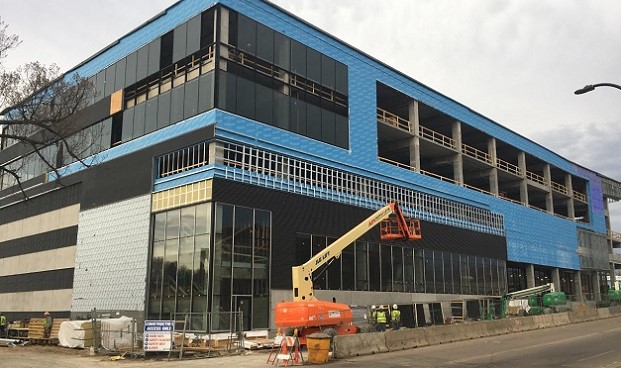
MINNEAPOLIS—In 2016, THOR Cos. made a commitment to help revive the long-neglected North Minneapolis neighborhood, and that effort is bearing fruit. The Minneapolis-based firm is putting the final touches on its 92,000 square foot Regional Acceleration Center, the most visible sign of the area's comeback. The $36 million office and retail building, located at 1256 Penn Ave. N., will open in early July fully leased and ready for occupancy.
“We are extremely pleased with the tenant mix that THOR Development had delivered for our building,” says Ravi Norman, chief executive officer, THOR Cos. “The market's response confirms our belief that the Northside is primed for further commercial development – and we are here to lend a hand to any business owner who wants to explore taking advantage of real estate opportunities on what we're calling the 'Bold Northside' of Minneapolis.”
The four-story building, the cornerstone to what Norman and many local community leaders see as a new era for the Northside, will host as many as 300 employees once all the tenants move in, according to D'Angelos Svenkeson, vice president of THOR Development.
The first-floor has 8,800 square feet of retail space and will feature Sammy's Deli, a coffee-and-café style restaurant and the African-American-owned ME & I fitness center. Build Wealth MN, a nonprofit agency that helps individuals and communities overcome obstacles to financial success, will also set up shop on the first floor.
THOR decided to move its national headquarters from the suburbs to the RAC building and joining it as tenants on the 76,000 square feet of office space on the third and fourth floors are Target Corp., MEDA and Hennepin County. The third floor will also house the Richard A. Copeland art gallery and multi-use space, which will feature a revolving array of art exhibits created by local and regional artists, and an 8,600 square foot outdoor greenspace deck.
THOR's work to complete the building proceeds. As it enters the final month of building activity, the project's construction general contractor, THOR Construction, notes that it has surpassed its goal of employing at minimum a workforce composed of 40% minority and disadvantaged workers. According to Lea Hargett, vice president of THOR Consulting, the construction project hit 49%.
“We have consistently out-performed our own high standard for minority and disadvantaged worker hiring for the project,” she says, “due in large part to our very intentional process of engaging with those communities on an ongoing basis. Let the record show that there are plenty of qualified minority workers in the MN building trades, as demonstrated by our project results. We hope that other MN builders and developers take note of our results and accelerate their own workforce engagement programs.”
THOR, with annual revenues of $275 million, is the largest minority-owned company in MN, and ranks among the 10 largest African American-owned businesses in the US construction industry, according to Black Enterprise magazine.
“Our intention for this project has been two-fold all along,” says Norman. “One, to build a new home for our growing company, and two, to spark and accelerate community and economic revitalization on the city's Northside.”
© 2025 ALM Global, LLC, All Rights Reserved. Request academic re-use from www.copyright.com. All other uses, submit a request to [email protected]. For more information visit Asset & Logo Licensing.








